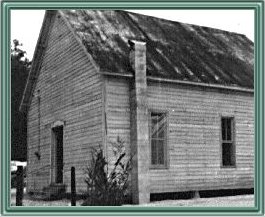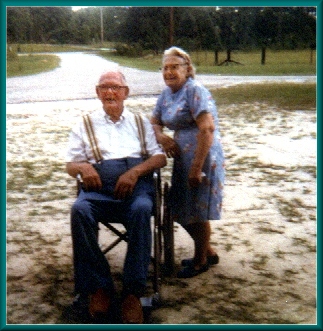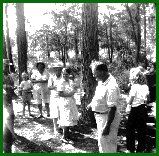 |
This is Macedonia Methodist Church at Macclenny,
Florida. The year is about 1955. The picture was taken by my brother, Walter, during a family reunion. |
| Memories of a Day Gone By! |
 |
This is Macedonia Methodist Church at Macclenny,
Florida. The year is about 1955. The picture was taken by my brother, Walter, during a family reunion. |
| Macclenny is
probably the biggest town in Baker County, Florida;
but Baker County is the kind of of place where there used to be
more hogs than people. Nowadays maybe there aren't quite so many
hogs and perhaps the people do outnumber the pigs simply because
most of the county's population now goes to work in "the big
city," that being Jacksonville. You Yankees would call this
commuting.
Baker County is in northeast Florida right next to the Florida - Georgia line, as far deep in "Cracker country" as you can get! My great great grandfather,William Garrett, and my great great grandmother, Henrietta Hogan Garrett, arrived there from Charlton County, Georgia shortly after the War Between the States. There they founded what became known as "the Garrett Community." My great great grand uncle, George Garrett, helped establish the Macedonia Methodist Church where my grandfather,Francis Marion Garrett, was pastor for many years. I don't remember hearing him preach. By the time I came along he was a pretty old man. In fact, I do not remember ever attending a regular service at Macedonia. When I was a little girl during the fifties, I don't think that there were any. It was just mostly a place for homecomings, and funerals, and family reunions. Once a year, generally in late June, my family went to Macedonia for the "Garrett Family Reunion." It was quite a reunion too because, in true Southern fashion, the Garrett Family Reunion did not just draw Garretts butMobleys and Crews and anybody remotely connected to the Garretts or who claimed to be. The big day was always on a Sunday. So first we would always have some preaching. That was the part I always dreaded and not just because I have doubts about the existence of God; but, because the old church did not have air conditioning, few places did back then, and the windows were narrow and did not let in much air; and, because what we had to sit on were long hard benches without backs. We would also have some music; gospel, of course. That was a little better. I especially remember that there was one Hispanic woman who was married to somebody or another. She would sing in Spanish. Back then, the sound of Spanish was still odd, at least in north Florida. So we thought that was something. Finally the services would end and we would all file out for a "dinner on the ground" which wasn't really on the ground. It was just outdoors on long, rather high, tables. There were no chairs unless you brought your own. The tables were too high for most chairs anyway. The food was brought by the various "attendees" and had been prepared almost exclusively by the female attendees who had, for the most part, spend the entire day before cooking. This was all before anyone had heard of "women's lib." It was a time when men still did not cook except for maybe a "fish fry." Barbecues and grills had not quite made it yet. The men might help carry some of the heavy stuff to the tables; but, it was always the women who laid it out. There was fried chicken, baked ham, macaroni salad, potato salad, fruit salad which we called "ambrosia," and banana pudding, corn on the cob, pies, cakes. If somebody thought it was good to eat, it was there. It took a long time to put it all on the table. I would generally pass the time by walking about the old cemetery. Like most old country churches of the time Macedonia had a
cemetery next to it; and, it was some cemetery. It still is some
cemetery and My great great grandparents, great grandparents, grandparents, and now my brother are buried there as well as assorted aunts and uncles and cousins. I used to walk that old cemetery and wander about all the people there; and, take interest in how different the cemetery was from more modern ones. For one thing, there was no grass there. It was maintained in true country fashion by sweeping the grass and weeds away. The newer graves had modern tombstones and generally lay flat; but, the older graves were maintained as they were originally. which is to say that the earth over them was made into a mound and then decorated with shells and bits of pottery and colored glass. ...Finally all the food would be laid out and everyone would go get a plate and sat wherever they could find: in chairs they have brought, in their cars, on the church steps; few actually went inside the church to eat. Many stood at the table. We had an old outhouse for a toilet! It was in the woods, a pretty good walk in the other direction from everything else. After dinner, while some puts things away and others hung around catching up on old times, many of us would put on our bathing suits and go down to the old swimming hole, a runoff from theSt. Mary's Riverwhich was relatively shallow and had white sand on one side of it like a beach. The other side was wooded and there had long been a rope tied to a tree there with a tire at the other end. The older kids would climb the tree, get in the tire and swing out over the water, sometimes dropping below. My great grandfather had once been a boy enjoying that swimming hole. So had my grandfather and father. It was a nice family tradition. |
 |
Eventually, they started holding regular services
again at Macedonia and the new congregation wanted a new church
which was understandable. They built a new church on the other side of the cemetery
and then tore down the old church which was unnecessary. The old church was such a piece of Americana, pure American Gothic in its simplicity. It should have been restored and used as some kind of museum. The heart kind of went out of our reunions after that although last I heard they are still holding reunions there. |
| home | Macedonia Today |
life in a cracker
barrel |

Click image to enlarge |
memories site index |
 Click image to enlarge |